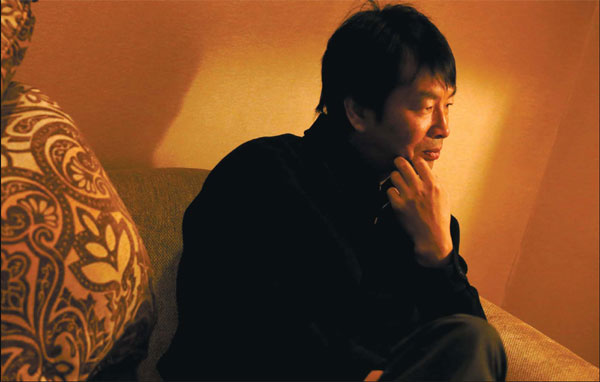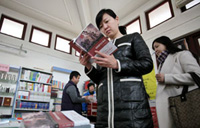
 'Taken 2' grabs movie box office crown
'Taken 2' grabs movie box office crown
 Rihanna's 'Diamonds' tops UK pop chart
Rihanna's 'Diamonds' tops UK pop chart
 Fans get look at vintage Rolling Stones
Fans get look at vintage Rolling Stones
 Celebrities attend Power of Women event
Celebrities attend Power of Women event
 Ang Lee breaks 'every rule' to make unlikely new Life of Pi film
Ang Lee breaks 'every rule' to make unlikely new Life of Pi film
 Rihanna almost thrown out of nightclub
Rihanna almost thrown out of nightclub
 'Dark Knight' wins weekend box office
'Dark Knight' wins weekend box office
 'Total Recall' stars gather in Beverly Hills
'Total Recall' stars gather in Beverly Hills
Playing with fate
Updated: 2013-03-12 10:16
By Mei Jia (China Daily)
|
||||||||
 |
|
Liu Zhenyun continues exploring a free flow writing style in his latest novel I'm Not Pan Jinlian. Jiang Dong / China Daily |
Award-winning novelist takes a gamble with the story of a woman who fakes her divorce and rattles a political system with the repercussions, Mei Jia reports.
Author Liu Zhenyun says the publication of his latest novel, I'm Not Pan Jinlian, is probably the biggest risk he has ever taken. The Mao Dun Literature Prize-winner says the novel may be the first of its kind about the country's political system, and it's all about "how sesame turns into watermelon, and ants turn into elephants".
|
|
| Books help turn a new page |
|
|
| Morals vs Money |
Liu creates a panorama of Chinese political structure through a humorous drama featuring an extraordinarily persistent rural woman, Li Xuelian.
Liu says he was not sure "if it's okay to write all those", by which he refers to scenes involving the top leaders and the woman's visits to high officials.
Publishers of both print and digital versions backed him up. The novel has so far attracted 3 million clicks on Sina's e-reading section.
In the story, Li fakes a divorce with her husband, who treats the divorce as real and then marries another woman. Li tries to sue the betrayed man but is rebuffed by the court. As the fight between Li and her husband accelerates, she gets a bad name from the husband, who labels her as Pan Jinlian, a character of the classic Outlaws of the Marsh who is known as an unfaithful wife.
Li persists in visiting officials at different levels to seek help. By accident, she meets one of the country's top leaders. The meeting ultimately changes the fate of all the officials she has visited before.
"There are no evil guys in the whole story. None of the officials are bad. And they even try to help Li," the author says.
"The problem is not the people involved, it's something to do with how power is constructed," Liu says.
Yet Liu insists his novel is not about politics.
"It's about the logic of life, about its absurdity, and the power of being absurd," he says.
The novel has three chapters. The first two are lengthy prologues about Li's visits. The third chapter, which Liu calls the book's "main body", is a 3,000-word story centering on another character, Shi Weimin.
Shi is a county chief who is relieved of his post because of Li. After losing his job, he makes a living by running a restaurant, selling a popular meat dish. Shi, trapped at the Beijing railway station during the Spring Festival travel rush, is eager to get home. He decides to play a trick.
Most Viewed
Editor's Picks

|

|

|

|

|

|
Today's Top News
Boston bombing suspect reported cornered on boat
7.0-magnitude quake hits Sichuan
Cross-talk artist helps to spread the word
'Green' awareness levels drop in Beijing
Palace Museum spruces up
First couple on Time's list of most influential
H7N9 flu transmission studied
Trading channels 'need to broaden'
US Weekly

|

|










